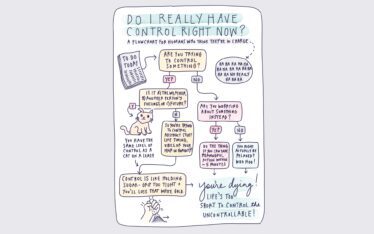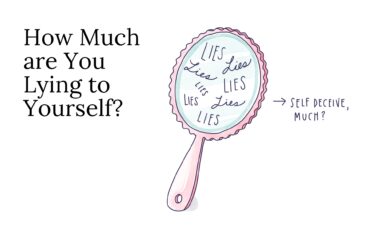As much as I want to bring you up to speed with what we covered in Part 1 about time, you guessed it: there just isn’t enough time. How about this? Go back and read the post before bed tonight… and in the meantime, here are the three points we covered last week:
#1: Use the Fresh Start Effect to your advantage.
#2: Focus on scarcity (instead of abundance) for once.
#3: Balance the mindsets of Chronos and Kairos.
I realize those headlines won’t make sense until you read the article. But time is of the essence (!) so we’ll soldier on with these last four points to help you master the tricky topic of time in your life.
#4: Look into your crystal ball with the help of Prospection.
Prospection is a snazzy feature of human consciousness that allows us to imagine what our futures could look like across a global future horizon. When we spend time looking in our imaginary crystal balls, pontificating different versions of our lives and what might just be in store for us into the future, it tends to be good for us. Psychologists tell us that focusing on our future temporal self leads directly to increased self-enhancement. Researchers also say this way of understanding the boundaries of our time is keenly related to our decisions about the goals we pursue, our emotional regulation, and our sense of urgency around our levels of social connectedness. What are you imagining for yourself this year? What’s possible for you to achieve? What do you want 2022 to look like and feel like, on December 31, 2022, when you’re reflecting back on it (perhaps with a bubbly drink in hand)?
#5: Make time as concrete as possible.
We take time, like the calendar year ahead of us, more seriously when we understand it with precision. Construal level theory will help explain this, as it ropes in the notion of psychological distance — that subjective sense we have about whether something is close or far from ourselves in the present moment. We’re more inclined to think abstractly about events that we perceive as psychologically distant, or far into the future (e.g.: “365 days is a looooong way away to get to 2023”). Scientists have made it clear that details become fuzzy or absent altogether when we construe larger psychological distances, whereas details become more concrete when we perceive events and possibilities to have smaller psychological distances. Here’s the problem: perceiving this year ahead of us as fuzzy and void of details is a recipe for a year of squander. How can you un-fuzz the details and make 2022 more tangible? Visual calendars help! What plans can you actively make to help shrink that psychological distance of time (e.g.: booking all of your time off through the end of the year)? This is true for your year and your life. How can you make your decades ahead more concrete and less abstract? Setting intentions and plans are a heck of a great start.
#6: Understand your desires will change over time.
Socioemotional selectivity theory proves what we intuitively know to be true: our perception of time horizons significantly impacts our motivation and goals. People with limited subjective time horizons (i.e.: the older folks) tend to favor goals related to meaning and emotional satisfaction, contrasted with goals of knowledge acquisition and novelty-seeking that are associated with longer time horizons (i.e.: the younger folks). This explains why 21-year-olds are into backpacking with Molly (or whatever the new designer drug is these days*) while 71-year-olds are into volunteering with friends at church. When time feels open-ended, we prioritize vitality-filled, knowledge-related goals. When time feels limited, we prioritize meaning-filled emotional goals. Since time is such a smooshy, malleable construct, it’s possible to manipulate our perceptions of our horizons to balance the vitality and meaning in our lives. If you’re on the younger side, how can you reflect on your diminishing number of Mondays left to help add more meaning and emotional nuance to your life? If you’re on the older side, how can you use novelty to stoke the fires of vitality?
*I Googled “what’s the best designer drug now” and apparently there’s a new one called Flakka? And so my search history continues to look alarming (case in point: for this post I was asking all sorts of unsavory questions about serial killing). How long will it take for some kind of authority to contact me? Is there a place I can check to see if I’m on a watchlist, like how I can find out my uber score? If I stop publishing posts you’ll know someone has come for me. Please know I am innocent of pretty much all charges.
#7: It’s true that the pandemic distorted our sense of time.
Your inability to accurately gauge when ANYTHING happened along the space/time continuum since March of 2020 isn’t (necessarily) because you’re getting old and washed up. Nope — just like muffin top and social anxiety, blame it on the pandemic! Stress distorts our perception of time, causing it to expand and contract in illusory ways. Researchers point out the lack of “newness” in our hibernate-at-home lives warped how we distinguish objective and subjective time. Boredom + negative stress = time warp. Positive stress, however, can stretch our perception of time out, which is what many of us are longing for: a life that doesn’t pass us by in a blur. How can you elongate time by adding more stimulation and excitement to your life — even in small ways?
Random but inspiring quotes about time:
- “Men talk of killing time, while time quietly kills them.” ~Dion Boucicault
- “Time is a cruel thief to rob us of our former selves. We lose as much to life as we do to death.” ~Elizabeth Forsythe Hailey
- “The key is in not spending time, but in investing it.” ~Stephen R. Covey
- “Time waits for no one.” ~Folklore
- “Lost time is never found again.” ~Benjamin Franklin
- “How did it get so late so soon? It’s night before it’s afternoon. December is here before it’s June. My goodness how the time has flewn. How did it get so late so soon?” ~Dr. Seuss
- “Those who make the worst use of their time are the first to complain of its brevity.” ~Jean De La Bruyere
- “Time is what we want most, but what we use worst.” ~William Penn
- “Your time is limited, so don’t waste it living someone else’s life.” ~Steve Jobs
- “The way we spend our time defines who we are.” ~Jonathan Estrin
- “A man who dares to waste one hour of time has not discovered the value of life.” ~Charles Darwin
- “If we take care of the moments, the years will take care of themselves.” ~Maria Edgeworth
- In 1967 the 13th General Conference on Weights and Measures provisionally defined the second as 9,192,631,770 cycles of radiation associated with the transition between the two hyperfine levels of the ground state of the cesium-133 atom. (I found this factoid online and absolutely had to include it, for all its head-exploding properties.)
Another 52 Mondays are in store for you this year. What will you make of them? You can’t add more time to your year, but you can be mindful of making the most of the time you have. You’ll squander some of it, for sure… but as discussed in the 7 points between Part 1 and here in Part 2, there are ways to squander SO MUCH LESS OF IT. Enjoy. 🙂







